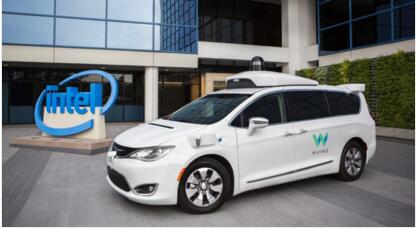Left Unsaid in Waymo-Intel Deal
Left unsaid in the announcement is what this new partnership entails, and on whose chip Waymo is running the heavy-duty deep-learning algorithms.

Left unsaid in the announcement is what this new partnership entails, and on whose chip Waymo is running the heavy-duty deep-learning algorithms.
Intel CEO Brian Krzanich took to his blog to tout Intel’s collaboration with Waymo on self-driving car technology.
The gist of his message is that Waymo’s new vehicles, self-driving Chrysler Pacifica hybrid minivans, “feature Intel-based technologies for sensor processing, general compute and connectivity, enabling real-time decisions for full autonomy in city conditions.”
The 64-million dollar question for Intel and Waymo, however, is how far this relationship will take both companies, respectively, down the autonomous-vehicle road.
Might there be potholes between the yellow bricks?
Right now, virtually every player in the automotive space — tech companies, traditional OEMs and tier ones — is scrambling for an edge on one another in the future design of highly automated vehicles. I understand that every partnership counts, especially when the deal involves names as prominent as Waymo and Intel. As a reporter, I’m loath to ignore news like this.
But then, when the mating elephants won’t offer important details about their union, I struggle to understand what exactly is the news here. Are the elephants bonding or merely flirting? An Intel spokeswoman told us, “We don’t disclose commercial arrangements.” She did say, “Both companies bring complementary skills and expertise to the collaboration.”
One way to find out the depth of the two companies’ partnership is to know which Intel technologies Waymo is using.
The Intel spokeswoman said that featured in Waymo’s self-driving Pacifica hybrid minivans are “Intel Xeon processors for compute, Intel Arria FPGAs for image analytics and Intel Gigabit Ethernet and Intel XMM modems for connectivity and communication solutions.”
Therein lies the problem, according to Mike Demler, senior analyst at the Linley Group. Obviously, having Waymo use “Intel-based technologies” is good for expanding Intel’s presence in the automotive market. But “the components they’re using are general purpose and don’t indicate any specific advances by Intel in autonomous driving,” said Demler.

(Photo: Intel)
Demler bluntly told us that the announcement "really offers no new information. I wouldn’t read too much into it.”
Demler correctly identified Intel’s components inside Chrysler Pacifica hybrid minivans as FPGAs for sensor processing, Core or Xeon processors for general compute and LTE modems for connectivity. He said, “We already knew Google (Waymo) was using FPGAs in its test vehicles, which makes sense while the self-driving algorithms are still in such an early stage of development.”
‘What’s not said’
More significantly, though, left unsaid in Krzanich’s blog, is where Waymo is running the heavy-duty deep-learning algorithms. Demler speculated, “That could be on one of Nvidia’s chips, or another Google-designed Tensor Processor ASIC.”
The Intel spokeswoman deferred to Waymo to answer our questions as to whether this partnership indicates that Waymo’s adoption of Intel’s platform for its autonomous cars. [Waymo had not answered our inquiry by press time.]
The Intel spokeswoman, however, did tell us, “By working closely with Waymo, Intel is offering Waymo’s fleet of vehicles the advanced processing power required for level 4 and 5 autonomy.”
CONTACT US
USA
Vilsion Technology Inc.
36S 18th AVE Suite A,Brington,Colorado 80601,
United States
E-mail:sales@vilsion.com
Europe
Memeler Strasse 30 Haan,D 42781Germany
E-mail:sales@vilsion.com
Middle Eastern
Zarchin 10St.Raanana,43662 Israel
Zarchin 10St.Raanana,43662 Israel
E-mail:peter@vilsion.com
African
65 Oude Kaap, Estates Cnr, Elm & Poplar Streets
Dowerglen,1609 South Africa
E-mail:amy@vilsion.com
Asian
583 Orchard Road, #19-01 Forum,Singapore,
238884 Singapore
238884 Singapore
E-mail:steven@vilsion.com
